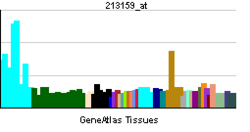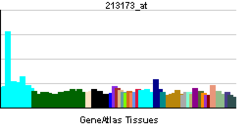- PCNX
-
Pecanex homolog (Drosophila) Identifiers Symbols PCNX; FLJ23409; FLJ45663; KIAA0805; KIAA0995; PCNXL1 External IDs MGI: 1891924 HomoloGene: 40997 GeneCards: PCNX Gene Gene Ontology Cellular component • membrane
• integral to membraneSources: Amigo / QuickGO RNA expression pattern 

More reference expression data Orthologs Species Human Mouse Entrez 22990 54604 Ensembl ENSG00000100731 ENSMUSG00000021140 UniProt Q96RV3 Q3TD89 RefSeq (mRNA) NM_014982 NM_018814.3 RefSeq (protein) NP_055797 NP_061284.2 Location (UCSC) Chr 14:
71.37 – 71.58 MbChr 12:
82.96 – 83.1 MbPubMed search [1] [2] Pecanex-like protein 1 is a protein that in humans is encoded by the PCNX gene.[1][2][3]
References
- ^ Roux AF, Rommens JM, Read L, Duncan AM, Cox DW (Sep 1997). "Physical and transcription map in the region 14q24.3: identification of six novel transcripts". Genomics 43 (2): 130–40. doi:10.1006/geno.1997.4786. PMID 9244429.
- ^ Geisinger A, Alsheimer M, Baier A, Benavente R, Wettstein R (Apr 2005). "The mammalian gene pecanex 1 is differentially expressed during spermatogenesis". Biochim Biophys Acta 1728 (1-2): 34–43. doi:10.1016/j.bbaexp.2005.01.010. PMID 15777640.
- ^ "Entrez Gene: PCNX pecanex homolog (Drosophila)". http://www.ncbi.nlm.nih.gov/sites/entrez?Db=gene&Cmd=ShowDetailView&TermToSearch=22990.
Further reading
- Nakajima D, Okazaki N, Yamakawa H, et al. (2003). "Construction of expression-ready cDNA clones for KIAA genes: manual curation of 330 KIAA cDNA clones.". DNA Res. 9 (3): 99–106. doi:10.1093/dnares/9.3.99. PMID 12168954.
- Nagase T, Ishikawa K, Suyama M, et al. (1999). "Prediction of the coding sequences of unidentified human genes. XI. The complete sequences of 100 new cDNA clones from brain which code for large proteins in vitro.". DNA Res. 5 (5): 277–86. doi:10.1093/dnares/5.5.277. PMID 9872452.
- Nagase T, Ishikawa K, Suyama M, et al. (1999). "Prediction of the coding sequences of unidentified human genes. XIII. The complete sequences of 100 new cDNA clones from brain which code for large proteins in vitro.". DNA Res. 6 (1): 63–70. doi:10.1093/dnares/6.1.63. PMID 10231032.
- Strausberg RL, Feingold EA, Grouse LH, et al. (2003). "Generation and initial analysis of more than 15,000 full-length human and mouse cDNA sequences.". Proc. Natl. Acad. Sci. U.S.A. 99 (26): 16899–903. doi:10.1073/pnas.242603899. PMC 139241. PMID 12477932. http://www.pubmedcentral.nih.gov/articlerender.fcgi?tool=pmcentrez&artid=139241.
- Heilig R, Eckenberg R, Petit JL, et al. (2003). "The DNA sequence and analysis of human chromosome 14.". Nature 421 (6923): 601–7. doi:10.1038/nature01348. PMID 12508121.
- Ota T, Suzuki Y, Nishikawa T, et al. (2004). "Complete sequencing and characterization of 21,243 full-length human cDNAs.". Nat. Genet. 36 (1): 40–5. doi:10.1038/ng1285. PMID 14702039.
- Gerhard DS, Wagner L, Feingold EA, et al. (2004). "The status, quality, and expansion of the NIH full-length cDNA project: the Mammalian Gene Collection (MGC).". Genome Res. 14 (10B): 2121–7. doi:10.1101/gr.2596504. PMC 528928. PMID 15489334. http://www.pubmedcentral.nih.gov/articlerender.fcgi?tool=pmcentrez&artid=528928.
Categories:- Human proteins
- Chromosome 14 gene stubs
Wikimedia Foundation. 2010.
